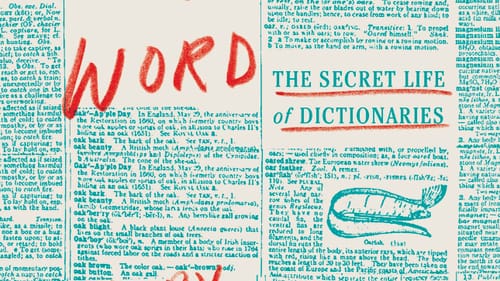Stay in the Loop
BSR publishes on a weekly schedule, with an email newsletter every Wednesday and Thursday morning. There’s no paywall, and subscribing is always free.
She has words for you
'Word By Word: The Secret Life of Dictionaries' by Kory Stamper

It’s funny, feminist, and unabashedly nerdy, but who would have guessed that one of the best (and best-selling) books of 2017 would be about dictionaries?
Okay, I absolutely guessed it, but only because I’ve seen Kory Stamper speak, so I know how effortlessly she roams from Old English swearwords to lolcats to hilariously snarky 19th-century lexicography feuds.
Harmless drudge
The purple-haired, South-Jersey-based Stamper, a lexicographer for Merriam-Webster and the friendly face behind many of its “Ask the Editor” videos, is a word-nerd rock star, so it’s little wonder her appearance at the Free Library of Philadelphia last week to celebrate the launch of her first book, Word By Word: The Secret Life of Dictionaries, was packed with an eager audience. Stamper delivered wryly humorous passages, footnoted by juicy plums of definitions, to enthusiastic applause.
Stamper, who studied Old English and Finnish, didn’t set out to become one of the country’s leading dictionary experts; she applied for an administrative job that sounded well suited for a book lover and found herself ushered into the Merriam-Webster's strange world, where talking is forbidden (at least on the second floor, where editors toil) and vast archives of little paper citation slips document the growth, change, and pitfalls of the last 150 years of this “beautiful, bewildering language.” She’s been there more than 20 years as one of the dictionary’s “harmless drudges,” pondering everything from the nature of love to whether but is really a preposition.
Whatever you do, though, don’t confuse Stamper with the kind of person who corrects apostrophes on subway advertisements and holds her nose at words like irregardless (stickler, noun: one who insists on exactness or completeness in the observance of something). “The lexicographer’s job is to tell the truth about how language is used,” she writes, and training for the job involves breaking away from English-teacher rules like “never end a sentence with a preposition.” Such prescriptivist rules come from a long tradition of efforts to standardize English, to make it more like Latin, and to differentiate between literate elites and everyone else, Stamper argues:
Standard English as it is presented by grammarians and pedants is a dialect that is based on a mostly fictional, static, and Platonic ideal of usage. . . . It doesn’t preserve English so much as pickle it.
The precise shade of "bitch"
Lexicographers, then, show us English as it really is, warts, obscenities, ugly, illogical constructions, and all. They strive to be objective—to steer readers straight with precise shades of meaning and warn them when dangerous waters lie ahead.

That’s why Stamper was surprised when she noticed one day that the Merriam-Webster Collegiate Dictionary entry for the noun “bitch” wasn’t marked as offensive. This brought up the question to which Stamper devotes a chapter: is “bitch” (in the sense of “a lewd or immoral woman” or “a malicious, spiteful, or overbearing woman”) inherently offensive? Is there such a thing as a woman who is objectively a bitch, or is it always disparaging? Certainly there are plenty of efforts to reclaim the term (such as Bitch magazine), but, Stamper notes,
The force of the word’s full meaning is contained in something that lexicographers can’t measure: the interplay between intention and reception… If I walk down the street and hear a man I do not know. . . . yell, “Nice, bitch!” at me, I will probably not respond as if he had yelled “Nice day!”
(Stamper won that argument, as the current definition shows.) lexicographers might come to a word in good faith, but they always bring the baggage of lived experience and their own biases and blind spots—and nowhere are these in evidence more than when dealing with slurs. “Words have substance,” Stamper writes:
We write them with our hands, we speak them with our mouths, we bear the scars they inflict on our bodies: The fish-line twist of my mother’s mouth, sucking on “bitch” like a canker sore as she talked about what it was like to be a woman manager in manufacturing; the three droplets of spittle that hitched a ride with the affricate and flew from the mouth of my dad’s friend, in profile against the western sun, as he called his ex-wife a bitch; the heat rash of anger and embarrassment (why embarrassment?) that flares up my cheeks as the cacophony of the city splits like a curtain and allows “bitch” to hang in the spotlight for an airless moment; the first that clenches in my chest as the car rounds the corner, trailing male laughter and a whiff of gasoline.
Words do have substance, and Stamper deploys them with care and grace. She pivots from poking fun at the company’s eccentric founder and patron saint, “Uncle Noah” Webster, to recounting the difficult and fraught search, prompted by a write-in campaign, for a nonracist definition of nude. Stamper’s impressive knowledge reaches back into ancient history and linguistics, but her voice and mentality rest at the bleeding edge of the 21st century. Word By Word is no dry tome; it’s a witty, erudite, and thought-provoking romp through the English language and the minds of those who love it.
What, When, Where
Word By Word: The Secret Life of Dictionaries. By Kory Stamper. Pantheon Books, 2017. 296 pages, hardcover, $26.95, available at amazon.com.
Sign up for our newsletter
All of the week's new articles, all in one place. Sign up for the free weekly BSR newsletters, and don't miss a conversation.

 Sarah Grey
Sarah Grey